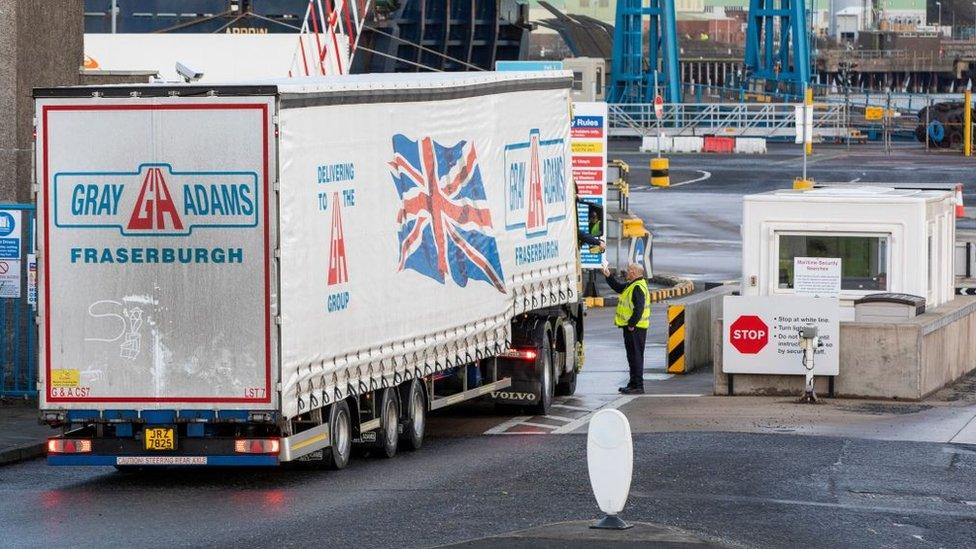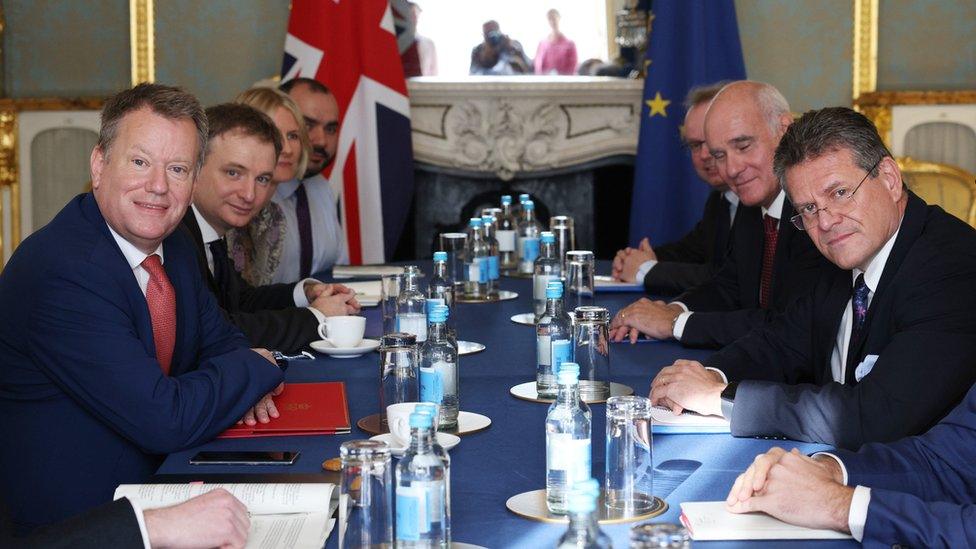Brexit: UK indicates European court may have NI Protocol role
- Published
- comments

The protocol led to inspections at ports on certain goods imported into Northern Ireland from Great Britain
The UK government has indicated the European Court of Justice could have a role in the Northern Ireland Protocol.
It could mean the court ruling on issues of EU law, but not having the final say in protocol disputes.
The role of the European Court of Justice (ECJ) has not yet featured in current negotiations with the EU, but the UK is keen to engage on the issue.
But European Commission Vice-President Maroš Šefčovič said the EU was not ready to discuss the role of the ECJ.
The Northern Ireland Protocol, external is a deal agreed between the UK and the EU in 2019 as part of the Brexit talks.
It avoids a hard border on the island of Ireland by keeping Northern Ireland in the EU's single market for goods.
That creates a new trade border between Northern Ireland and the rest of the UK.
On Friday, the EU said medicines would continue to be available in Northern Ireland at the same time as in the rest of the UK under plans to simplify the protocol.
UK Brexit Minister Lord Frost said the proposal came after talks between the two sides and the UK would consider the plan "positively".

Analysis: Is the UK more serious about reaching a deal?
Nothing has been agreed, but these are certainly significant developments which open up more space in the negotiations.
The UK is moving their position by acknowledging that the European Court of Justice (ECJ) needs to be there to rule on matters of EU law.
However they are still adamant the ECJ cannot have the final say in Northern Ireland Protocol disputes.
There is a long way to go on this but it is perhaps a signal that the UK is more serious about trying to reach a deal.
Some on the EU side thought the demands on the ECJ meant the UK was merely going through the motions as a prelude to triggering Article 16.
The other significant shift from the UK is the acknowledgement that a big, comprehensive deal may not be possible, and instead will have to come in stages.
What they will want to do in the new year is focus more intensively on customs and agri-food, and how checks on goods coming from Great Britain into Northern Ireland can be minimised.
UK negotiators believe the EU will need to move significantly further on these issues.
And then they can start to tackle some of the other issues, such as the ECJ.

The protocol has caused practical difficulties for some businesses, while unionists have said it undermines Northern Ireland's constitutional position as part of the UK.
The UK government has also said it wants to reverse its previous agreement on the oversight role of the ECJ, which is the EU's highest court.
Its preferred option is a new governance arrangement in which disputes would ultimately be resolved by an independent arbitrator.
However, the government is now open to discussing a role for the ECJ, which could draw on other EU agreements.
One example could be the EU's association agreement with Ukraine.
In that deal, if a dispute arises relating to an interpretation of EU law, the arbitration panel that oversees the agreement requests a binding ruling from the ECJ.
On all other matters, the arbitrators oversee the agreement without any ECJ involvement.
'Interim solutions'
The UK is also willing to accept a "staged" approach to fixing protocol issues rather than one comprehensive agreement.
That could involve tackling the most pressing practical and governance problems first before moving on to other issues.
A UK government source said: "Since the EU won't address all the issues we put on the table now, we are willing to look at interim solutions which deal with the most acute problems.
"But any such interim agreement must put a stop to the ECJ settling disputes between us and the EU, now and in the future."

Brexit Minister Lord Frost and European Commission Vice-President Maroš Šefčovič are leading talks on the NI Protocol
The UK believes that the EU has overstated the extent to which its October proposals would reduce checks on goods.
The government thinks the early months of next year will be the crunch point during which it will become clear whether a deal can be reached.
It wants to resolve the major issues in advance of next May's Northern Ireland Assembly elections.
On Friday, though, Mr Šefčovič said the EU was not yet ready to discuss the role of the ECJ in the Northern Ireland Protocol.
He said the court's role was "irreplaceable" in ensuring single market rules are applied.
Without the ECJ you cannot have access to the single market, he said.
"It's as simple as that," he added.
An EU official backed up that position saying a so-called Swiss style model on governance would not work for the protocol, politically or legally.
The protocol was "completely different" to what had been discussed with the Swiss as it involved the "wholesale application" of EU rules - therefore the "full powers" of the ECJ were needed.
The official also rejected the UK's suggestion of a staged approach to negotiations.
The chief executive of one of Northern Ireland's largest exporters has said he remains "very supportive" of the Northern Ireland Protocol.
'Adding uncertainty'
Liam Nagle was speaking as Norbrook reported sharply-increased pre-tax profits.
The business, which is based in Newry, County Down, develops and manufactures veterinary medicines.
Mr Nagle said he was also concerned the UK's threats to use Article 16 was "adding to uncertainty we could do without".
In 2021, the business increased its turnover by 9% to £231m while pre-tax profits rose more than sixfold from £4m to £27m.
Mr Nagle said there were some "minor teething problems" earlier in the year but suppliers had now got to grips with the changes.
He said Norbrook had changed some supply lines and now ships more goods directly from Irish ports to the EU, cutting out the Great Britain landbridge.
Some EU customers had been asking about the possible impacts of Article 16, wanting to know what its implications could be for imports.
Mr Nagle added that one impact of Brexit had been to add to the difficulties in finding staff.
The protocol does not cover immigration so Northern Ireland remains part of the UK system which ended freedom of movement with EU countries other than Ireland.
He said the business currently has 200 open positions which was "not unique" among major manufacturers.
Related topics
- Published2 February 2024

- Published18 September 2021

- Published17 December 2021
